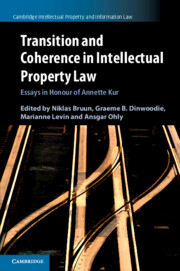13 results
B - International Commitments and Constraints
- from Part I - Transition
-
- Book:
- Transition and Coherence in Intellectual Property Law
- Published online:
- 29 December 2020
- Print publication:
- 07 January 2021, pp 83-154
-
- Chapter
- Export citation
Part I - Transition
-
- Book:
- Transition and Coherence in Intellectual Property Law
- Published online:
- 29 December 2020
- Print publication:
- 07 January 2021, pp 11-208
-
- Chapter
- Export citation
Part II - Coherence
-
- Book:
- Transition and Coherence in Intellectual Property Law
- Published online:
- 29 December 2020
- Print publication:
- 07 January 2021, pp 209-486
-
- Chapter
- Export citation
Copyright page
-
- Book:
- Transition and Coherence in Intellectual Property Law
- Published online:
- 29 December 2020
- Print publication:
- 07 January 2021, pp vi-vi
-
- Chapter
- Export citation
Preface
-
- Book:
- Transition and Coherence in Intellectual Property Law
- Published online:
- 29 December 2020
- Print publication:
- 07 January 2021, pp xiii-xvi
-
- Chapter
- Export citation
A - Forms and Institutions
- from Part I - Transition
-
- Book:
- Transition and Coherence in Intellectual Property Law
- Published online:
- 29 December 2020
- Print publication:
- 07 January 2021, pp 13-82
-
- Chapter
- Export citation
B - IP Overlaps
- from Part II - Coherence
-
- Book:
- Transition and Coherence in Intellectual Property Law
- Published online:
- 29 December 2020
- Print publication:
- 07 January 2021, pp 305-404
-
- Chapter
- Export citation
A - Intellectual “Property” and its Limits
- from Part II - Coherence
-
- Book:
- Transition and Coherence in Intellectual Property Law
- Published online:
- 29 December 2020
- Print publication:
- 07 January 2021, pp 211-304
-
- Chapter
- Export citation
C - New Agents and the Challenge of New Technologies
- from Part I - Transition
-
- Book:
- Transition and Coherence in Intellectual Property Law
- Published online:
- 29 December 2020
- Print publication:
- 07 January 2021, pp 155-156
-
- Chapter
- Export citation
Conclusion
-
- Book:
- Transition and Coherence in Intellectual Property Law
- Published online:
- 29 December 2020
- Print publication:
- 07 January 2021, pp 487-512
-
- Chapter
- Export citation
Contents
-
- Book:
- Transition and Coherence in Intellectual Property Law
- Published online:
- 29 December 2020
- Print publication:
- 07 January 2021, pp vii-xii
-
- Chapter
- Export citation
C - (Un-)fairness
- from Part II - Coherence
-
- Book:
- Transition and Coherence in Intellectual Property Law
- Published online:
- 29 December 2020
- Print publication:
- 07 January 2021, pp 405-406
-
- Chapter
- Export citation

Transition and Coherence in Intellectual Property Law
- Essays in Honour of Annette Kur
-
- Published online:
- 29 December 2020
- Print publication:
- 07 January 2021



